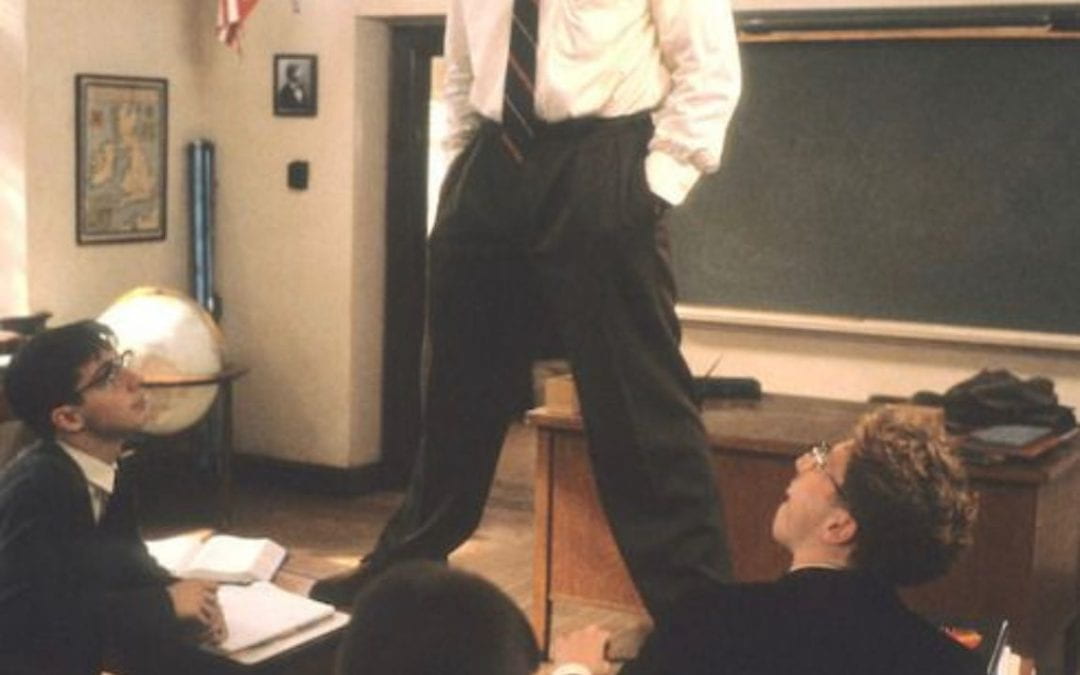By Elena Hijazi | Staff Writer
Film and literature are both succinct artforms that hypnotize and emotionally move the great feelers of this world. The 1989 film Dead Poets Society is one that weaves the threads of literature into the gown of film beautifully.
The film’s premise achieves the natural inclusion of literature as it revolves around English teacher Mr. Keating, played by the late and heartful Robin Williams, and his teenage male students. This is a brilliant way to allow the references of Walt Whitman’s “That the powerful play goes on and you may contribute a verse.”, John Keating’s “but only in their dreams can men be truly free”, Thoreau’s “most men lead lives of quiet desperation.”, and Horace’s “carpe diem” to flow perfectly on-screen. Poetry recitations are not forced, and their delivery is far from pretentious and preachy because of this. English teachers are supposed to quote sonnets and recite poems mid-conversations. Nothing is forced when it is expected.
Dead Poets Society appears to be very optimistic at first – maybe a bit too much. Mr. Keating preaches to the choir of his young and impressionable men to seize the day and to suck the marrow out of life’s bone! As the film goes on, one of Keating’s students gets in trouble for releasing a profane article in the school, following what he understood to be his teacher’s advice. Keating explains to him what I believe to be the heart of the film, “sucking the marrow out of life does not mean choking on the bone.”
It is revealed early on in the film that Keating is not an optimist, but a realist. The film’s morals turn from black and white to grey, just like the morals of life. This is also symbolic of the transition from boyhood to manhood. Children love to look at things in black or white, good, or bad because it is simple. As one grows, so does one’s color scheme. Each color turns into a million shades. Life is composed of nuances beyond definitions that are writ in stone. This is what is revealed in the movie. The boys grow up, and Keating’s teachings grow alongside them.
We must be dreamers, but we must not be asleep. We can have our eyes wide open and comprehend that as the father of transcendentalism Henry David Thoreau once said, “most men lead lives of desperation.” It is a difficult balance to maintain. We do not want to be cynics and we cannot be optimists. Life will wear us down if we live in each extreme. We must not lose the glimmering optimism that we once had as children, but we must not surrender to the naiveté of la vie en rose. It is in fact, la vie en gris. It even rhymes.
Dead Poets Society is a special cinematic oyster that embraces a literary pearl. There are very few films like this one. This film assures me that life is a poem; it begins, it moves its readers, it is sometimes difficult to understand and thus, it makes you want to stop reading, but it ends eventually. And you have the choice to stop reading, but don’t we all know that the last line always harnesses the seeds that we were growing throughout the lines? This is my take on Dead Poets Society. I bestow it upon you with an open mind and heart. Thank you for taking the time to read this.


WOWWW
So proud of this amazing article !
This was a very interesting take on the Dead Poets Society !!
“And you have the choice to stop reading, but don’t we all know that the last line always harnesses the seeds that we were growing throughout the lines?“ I genuinely gaped when I read this.
Some words here can only be written by someone who sees too much and too deep, key traits for a writer who can make a change in the minds of others.
This is beautifully written, in both style and content. This movie has had a profound impact on me as a writer, and I am so glad to see it has influenced others as well. Other than that it teaches to “do more, and be more.”
Well done my friend!
مقال ممتاز
Keep it up!